Civic Engagement and Representation
"We were never meant to thrive or succeed in the system that we live in."—Tatiyana Benson
Civic Engagement and Representation
Black voters are told their votes matter, but after an election their concerns often go unheard. In this episode, Angela Fitzgerald talks to activist Tatiyana Benson about civic engagement. They’ll explore representation in government, policy reform and the hurdles to political participation.
GUEST
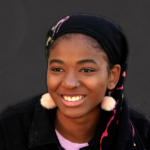
Tatiyana Benson
Tatiyana Benson is a student activist at UW-Madison and was born and raised in Madison, Wisconsin. She is a member of the organization Black Umbrella, a local Wisconsin coalition of community organizers and grassroots activists working together for Black liberation.
TRANSCRIPT
Angela Fitzgerald: How do you politically engage when you feel more like a prop than a constituent? Civic engagement isn’t as easy as simply asking the Black community to vote. For some, it feels like their voices and concerns only matter when their vote counts. Policies and issues that are important to us are often talked about, but rarely addressed. On this episode of Why Race Matters, we’ll talk with one young voice about the work that they’re doing to get the Black community politically engaged. But first, let’s discuss why race matters when it comes to civic engagement.
[upbeat music]
Angela Fitzgerald: Civic engagement is recognized as one of the keys to American democracy. And voting as one of the primary actions through which people can become engaged and let their voices be heard. The Wisconsin Constitution, adopted in 1848, prevented Black people from voting, but allowed white men, regardless of their citizenship status, and Native American men who renounced tribal affiliations to vote. Ezekiel Gillespie, a Black Milwaukee resident and former slave, fought and won the right to vote in 1866, establishing the vote for Black men in the state four years before the 15th amendment. Even then, state and local officials continued to use other discriminatory practices, like poll taxes, literacy tests, and direct intimidation to silence the Black vote.
A 2017 study found that nearly 17,000 registered voters in Dane and Milwaukee County were kept from polls by the state’s voter ID law, a law that disproportionately affected low income and Black voters. Voter suppression still remains today. Despite these setbacks, Black people have historically created their own pathways to civic engagement, and particularly when their interests are met. Grassroots activist and coalition leader Tatiyana Benson shares her experience working to promote Black civic engagement in her community.
Angela Fitzgerald: Thank you for joining us today, Tatiyana.
Tatiyana Benson: Thank you for inviting me.
Angela Fitzgerald: So tell us your story, and what has brought you to the place that you do the work that you do.
Tatiyana Benson: Well, I’m the youngest of 10 children.
Angela Fitzgerald: Oh, wow.
Tatiyana Benson: And like, I, my mom has like a really big heart, so we’ve always been, like all 10 of us have always been involved in our community by like, helping however we can.
Angela Fitzgerald: Mm-hmm.
Tatiyana Benson: And just tryna like, support people. I just continue wanting to help people. Like, you know, if you grow up always with the idea, like, when you can help, help. Then like, it’s, it like stays with you.
Angela Fitzgerald: And so, fast forwarding to today. Tell us about the work that you do around civic engagement, still uplifting Black voice, however you want to define it.
Tatiyana Benson: So I’m part of a grassroot organization, Black Umbrella. And our goal is Black liberation. And we think that you can get there through community support, development, and basically just like, freedom for the people, you know. And so with that, we do a lot of work with homeless disparities. And so we do a lot of work with like feeding people who sleep outside and tryna provide them with housing. And then we also plan a lot of marches to bring awareness to different things that are going on and like, legislation or just in politics in general.
Angela Fitzgerald: So why do you think that work is important here specifically? ‘Cause you were born and raised here and you’re still here.
Tatiyana Benson: Yeah.
Angela Fitzgerald: So you maybe recognize like, okay, I’m here for a reason. There’s some work that needs to be done. So just tell us more about that.
Tatiyana Benson: So I think personally for me, I’m still in Madison because I think that it needs a lot of help. So I think that if you have the space and the will to help something, help it. A lot of times, the Midwest gets a rep of like, a liberal utopia. And so I always tell people that Wisconsin is like cold Mississippi. [Angela laughing] There’s some things that you love about it, but it has some real, real issues that need to be like, fixed.
Angela Fitzgerald: I think like the South, when you think about the South, you think about segregation, you think about organizations like the KKK, you think about like really overt, in your face, like racism, and here I don’t think we get that sort of recognition where, like you said, we’re seen as, especially like Madison, we’re seen as liberal like, those things don’t happen here. And you’re saying like it does, just in a colder temperature. So I guess what would be the ideal for you as someone who again, born and raised here, committed to doing work here to create a state that you want to see, that you want other people to experience. Like what would that ideal look like, in a perfect world?
Tatiyana Benson: You know, this is actually a question I’m asked a lot, and I always feel slightly bad for my answer.
Angela Fitzgerald: Uh-oh, okay.
Tatiyana Benson: ‘Cause it’s like, not the one that people are looking for.
Angela Fitzgerald: Okay.
Tatiyana Benson: Maybe it’s ’cause I look at things too deep sometimes but, you know, I couldn’t tell you what that looks like. I don’t know what justice looks like. I don’t know if Black people know what justice look like in general. Have we ever really gotten it? So I couldn’t tell you what a just world looks like or feels like, I just know that this isn’t it. So I can’t tell you what a good Wisconsin looks like. I just know that this, what we have right now, doesn’t feel like it’s right. So it just needs to be better.
Angela Fitzgerald: I mean, that’s a perfect answer. Like, I don’t see that as being a wrong answer because you’re right. We may be upholding an ideal that we don’t even, we’ve never seen modeled.
Tatiyana Benson: Yeah.
Angela Fitzgerald: So how do you aspire to something that you don’t even know what that looks like. Right, so, wow. So Tatiyana, I’m interested in your thoughts around voting, specifically the messaging that is typically put out there for Black people to get out and vote. Those of us who still have that ability to do so, because that’s also kind of couched with the opinion of some that either their vote doesn’t matter or like, the lack of enthusiasm around voting because of who the options are. So what are your thoughts on just that topic in general?
Tatiyana Benson: So when I wasn’t able to vote actually, because I’m only 19.
[both laughing]
Tatiyana Benson: So when I wasn’t able to vote, I was, I used to preach to people like, “Vote, you have to vote every election, every time, you have to vote because people fought and died for us
Angela Fitzgerald: Right.
Tatiyana Benson: To be able to vote,” like our ancestors didn’t take that just for us to not vote. And then when I was able to vote, I started thinking about the fact that is hard, like, I get it’s my civic duty, but isn’t it a civic duty to like, give me something to actually vote for?
Angela Fitzgerald: Mmm.
Tatiyana Benson: Because, you know, and then I started thinking like, our ancestors fought and died for us to be able to vote, to have the right to vote. And I actually, I think it’s a form of oppression to tell people that they have to vote even when there’s nobody representing something that represents them. I think that the two-party system that has been created by corporate backing has forced Black people in America to feel like a last resort is a real option. And I don’t think that a last resort is a real option because I shouldn’t be voting for somebody that has out loud and open, been like, “Oh, like, no I don’t support things,” that I support to my core. Like that’s, I just don’t think that that’s fair to be asked to yeah, to participate in everything that doesn’t actually participate in my life. Like to ask me and then people will be like, “Oh, you’re voting for a lesser evil,” like, why do I have to vote for evil at all?
Angela Fitzgerald: Why are those the only options?
Tatiyana Benson: Now I would say that it’s important for everyone to vote every election because there’s always multiple things on a ballot. And so you don’t know what you might be missing just because the main thing on the ballot isn’t something that– write somebody in, you know. And don’t make it a joke either. Don’t like write in some, a joke, if you wanna write your mom’s name down ’cause you truly think she can rule this country, run this country better than somebody else, then like, do that, or if you wanna put down someone you know who won’t get enough votes but you truly believe that they’d be a better governor for your state, then that’s who you should vote for. You know, you shouldn’t feel forced to give your vote to somebody who has done nothing to earn it.
Angela Fitzgerald: So it’s a conversation that’s bigger than just, get out and vote. I mean, registering is great, practicing that right is great, but it’s beyond that and more of the representation piece. And then like, what are the issues? And if those things aren’t there, then like, you may be encouraging people to essentially waste something that’s been so valuable and that’s been fought for.
Tatiyana Benson: Yeah.
Angela Fitzgerald: Like for so long.
Tatiyana Benson: And the more that you vote, ’cause it’s funny to say, ’cause I’m saying like, you don’t have to vote if it’s like, it’s not supporting you. But the more that you vote, the more you’ll start seeing things on the ballots that support what you’re trying to say. The more you’ll start actually seeing things that represent your voice.
Angela Fitzgerald: It tends to just stop with go out and vote.
Tatiyana Benson: Yeah.
Angela Fitzgerald: And not with, what are you voting for? Even understanding the issues.
Tatiyana Benson: Yeah.
Angela Fitzgerald: That you could be voting for. So once you are able to vote, like these are the things that these people stand for and breaking it down so people understand what they are, et cetera. ‘Cause yeah, there have been even things I’ve seen on ballots I’m like, “I don’t even know what this word means.”
Tatiyana Benson: Yeah. [Angela laughs]
Angela Fitzgerald: Like, with all the degrees that I have, I don’t know what this is, but these are the choices I gotta, I feel like I need to check one just because it’s there, but no one’s defined this for me. It’s been worded in a way that to me, feels very complicated. So that can feel like, off-putting for people and a barrier to doing exactly what we’re encouraging them to do, so.
Tatiyana Benson: I don’t know if you ever heard of Afro-pessimism.
Angela Fitzgerald: I have, we’re talking about that in one of my classes now.
Tatiyana Benson: Yeah, so, I don’t believe that Black people can be free in the society that we live in. So it’s a big thing to question the entire foundation of our country. But when you think about it, our entire foundation of our country was written and created and built on the back of Black people. We were never meant to thrive or succeed in the system that we live in. It wasn’t created to support us either. So we keep tryna to like, okay, how can we do this? How can we do that? But the truth is, is that you can’t fix something that’s not broken, you just can’t.
Angela Fitzgerald: Mm-hmm.
Tatiyana Benson: So no matter how much you change it, at the end of the day, you will just like that book, The New Jim Crow, you will always see a new system emerge that is meant to hold, to oppress people. Like, it will always show up in a society that was created to oppress people.
Angela Fitzgerald: Right.
Tatiyana Benson: So you have to change it and fix it. You know, and when you say destroy the system, people get really scared. [Angela laughing]
Angela Fitzgerald: Right.
Tatiyana Benson: I remember I said that, I actually said that on the news before. And I got a bunch of like, comments and like, basically hate comments, I was getting hate mail. And people are like, “You can’t expect people to support you by saying stuff like destroy, this is our country, you know, like, you should feel love for it. ” And I do feel love for this country. That’s why I wanna destroy the evil that lives within it. And that’s what, that’s the system we live in. And that’s, and so to tell me that I don’t love America as much as you because I have a problem with the way that it’s shaped doesn’t make sense because I would just leave.
Angela Fitzgerald: It’s also contradictory, right? Because America was founded on destruction. So how are you saying now destroy is a bad thing when that’s how we came to be?
Tatiyana Benson: Yeah. How can you to expect me to feel like I’m loved in this society, in this country is ridiculous, you know? To try to fix a system that literally was started by stealing land and stealing people is a ridiculous idea to ever think that like, this could be a just system.
Angela Fitzgerald: Right.
Tatiyana Benson: When it was literally, like the constitution was written to make these things okay, but they’re not. So there is no justice in that.
Angela Fitzgerald: It makes perfect sense, when you think about where we are now and how we’re like, in the place historically where we’re like, that’s really being challenged and that’s what people are afraid of, to your point, right? People are afraid of something new, but we’ve never reconciled where we came from. So people are tryna say, “Hey guys, you recognize that like, historically this is why we are where we are.” Can we acknowledge that, in the hopes of building something new and moving forward, but you’re absolutely right. Thank you, like, you just dropped some major knowledge right now, that was like a class, like seriously, that was like a graduate level class, what you just described very like, succinctly, why we’re in the place that we are and why someone like you gets the pushback that you get. When you’re simply trying to uplift these very salient points, people understand like one point in time, we weren’t even considered human. So if we have recently are still, well not even recently, like we’re still fighting for humanity, hence Black Lives Matter.
Angela Fitzgerald: Yeah.
Tatiyana Benson: Like that’s the same argument as when we were considered three-fifths of a person. It’s the same thing, just in, written in a different form.
Angela Fitzgerald: Yeah.
Tatiyana Benson: So that’s why people are doing the things that you’re discussing, like questioning whether or not I can even vote for something that’s for my best interest, if my humanity is still a question mark in your mind. If you’ve never acknowledged me as being equal to you, then how can I trust you with my vote, right?
Angela Fitzgerald: And you also think about how it works. Like when you wanna add an amendment to fix something, you like add an amendment to fix something, but the old rules are still written in there. Like, you don’t just take them out.
Angela Fitzgerald: Right.
Tatiyana Benson: You know, so somewhere, it’s still written that Black people are three-fifths of a person.
Angela Fitzgerald: Right.
Tatiyana Benson: But then we decided that they’ll be awarded the same laws as people who are fully human. Like, we’ve never unwritten the fact that Black people were three-fifths of a person. Like, that’s never been unwritten, you can’t unwrite it.
Angela Fitzgerald: So, given that and given those who will be watching this, either can relate because they’re doing the work too or have been impacted by some of the systems and things you all are trying to overturn, or those who are like, “Wow, this is something I’m hearing for the first time. Didn’t know that there were people like you that felt this way or were committed to this work in this way.” What do you want either audience to take away from this conversation?
Tatiyana Benson: That honestly, if you’re doing nothing or you’re not even like, actively trying to do something, ’cause I’m not saying that not everybody can do everything.
Angela Fitzgerald: Right.
Tatiyana Benson: But if you’re not actively trying to do your part, ’cause I think everyone can play a role in fixing, in fixing America, Wisconsin, Madison, everyone can play a role. And so I think that the takeaway is just that like, do something, ’cause if you’re not, then you’re– Really, if you’re not, you don’t care. And that hurts, to think that people wouldn’t care about other people living happy lives, you know.
Angela Fitzgerald: Whew, that is so true. So it’s not a convenience thing. It’s not a, “When it’s nice outside, I’ll go protest, but we’re gonna take a break during the winter months, you guys.” Like what does it mean to really stay committed to something for decades if that’s what it takes to bring about that change.
Tatiyana Benson: Yeah.
Angela Fitzgerald: Yeah, thank you for that, Tatiyana.
Representation is on the rise politically within the Black community. In 2020, a record number of Black women ran for Congress. It’s a small step, but an important one. The more representation we have, the more likely that policies that positively affect our communities get passed. There’s no doubt that race matters when it comes to civic engagement, but maybe it’s time to stop lecturing certain communities to vote and start asking how to earn their vote instead. To learn more, go to pbswisconsin.org/whyracematters to find additional links and resources to help keep you informed. There, you can also check out the Why Race Matters podcast as well as additional episodes. [energetic music]
Speaker: Funding for Why Race Matters is provided by CUNA Mutual Group, Park Bank, Alliant Energy, Madison Museum of Contemporary Art, Focus Fund for Wisconsin Programming, and Friends of PBS Wisconsin.
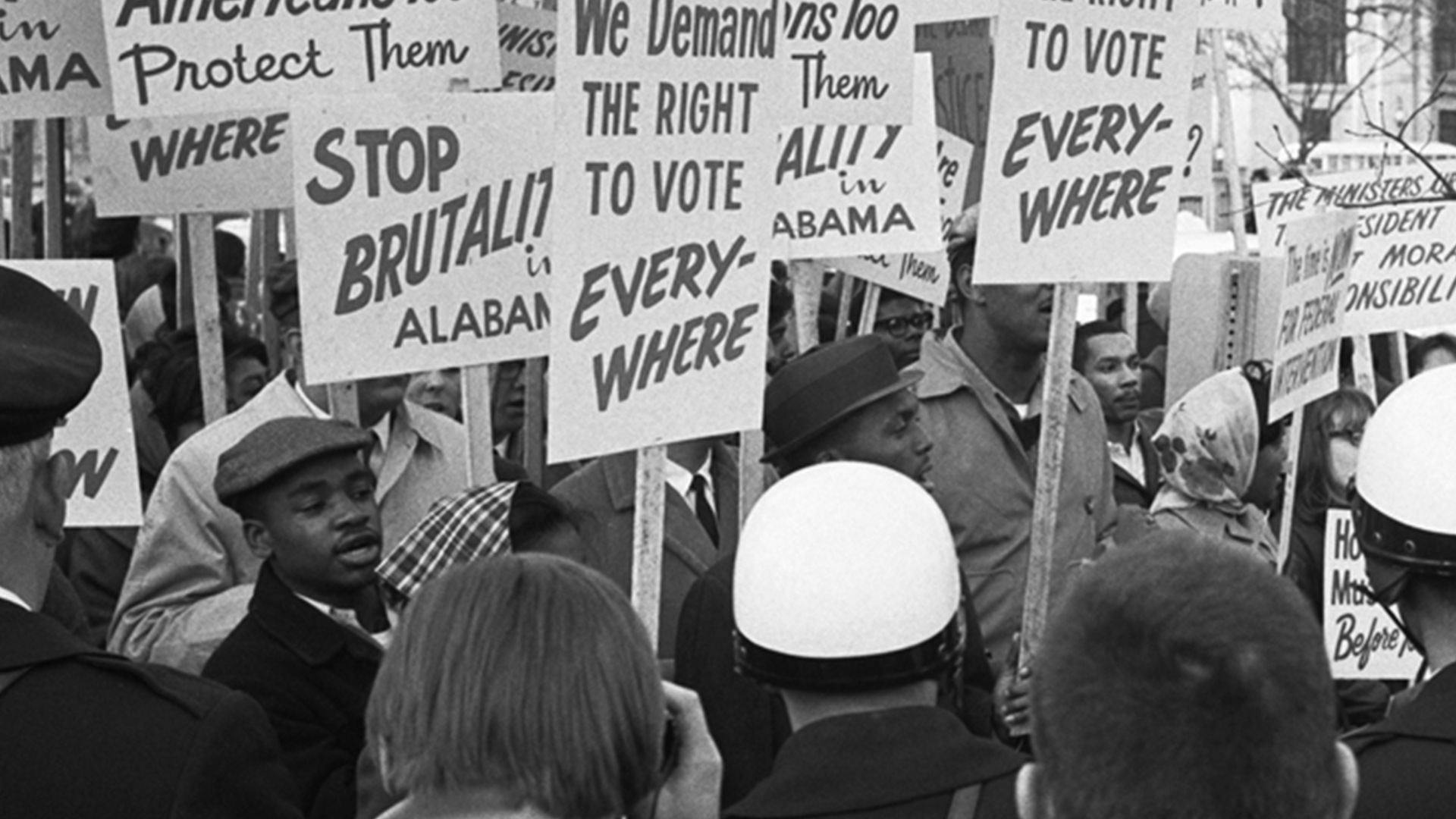
Photo/Warren K. Leffler
Resources
Tools to understand local and national politics, including information on elected officials, laws, voting rights, how to become engaged, and a look at the history of civic engagement in our state.
 Passport
Passport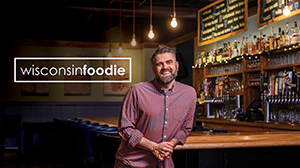


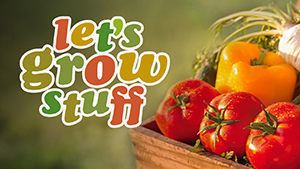
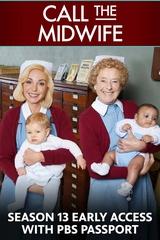
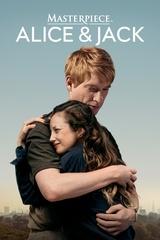

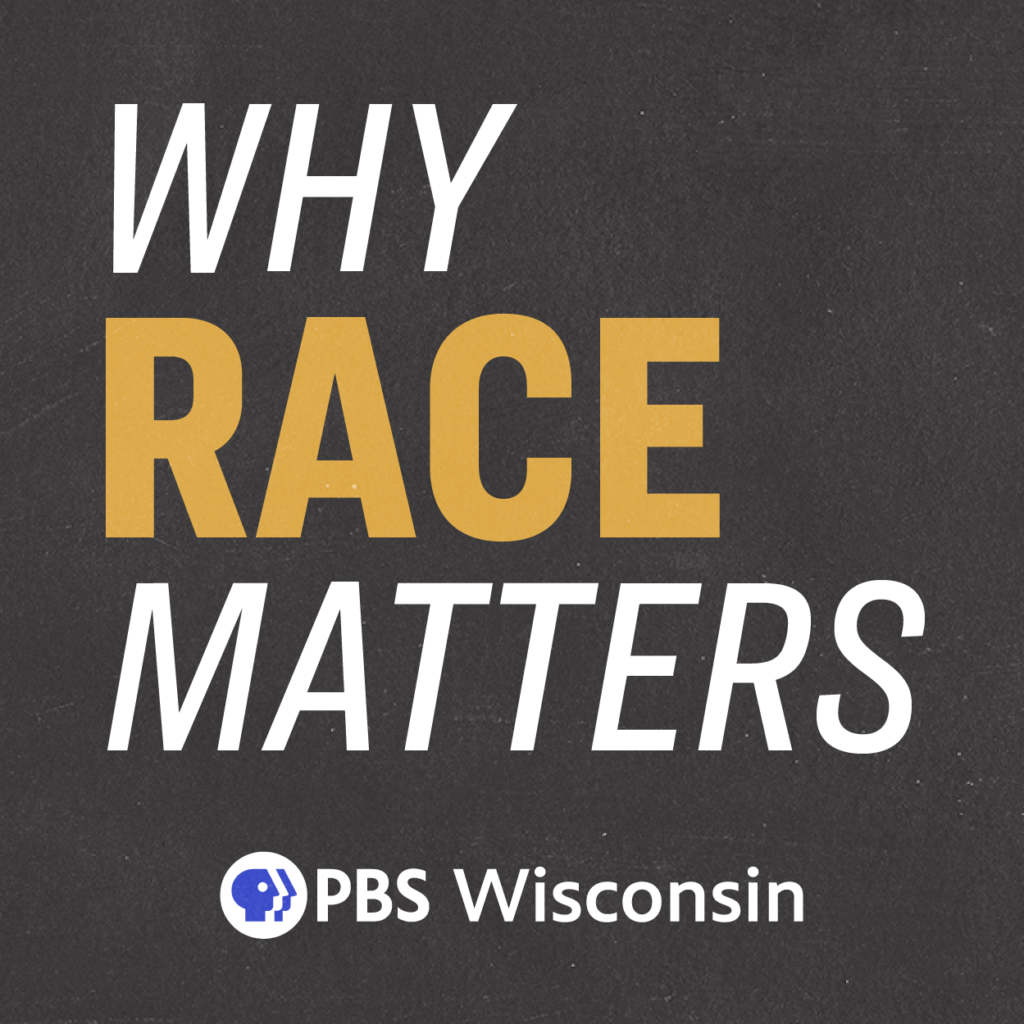

Follow Us